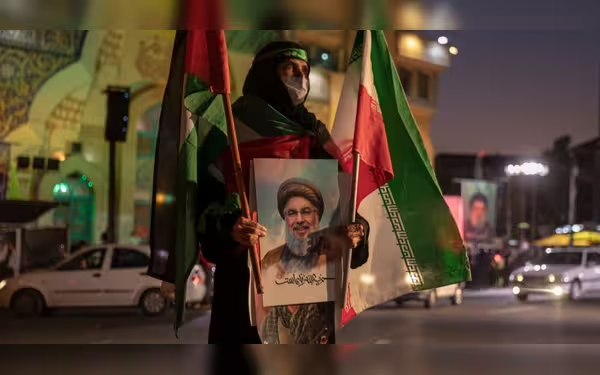Sunday, October 6, 2024 12:34 AM
Hezbollah Leadership Change After Nasrallah's Death
- Nasrallah's death creates uncertainty in Hezbollah's future.
- Potential power vacuum may shift Hezbollah's policies.
- Regional dynamics could change with new leadership.
 Image Credits: gnnhd
Image Credits: gnnhdThe death of Hezbollah's leader Hassan Nasrallah raises questions about the group's future and regional stability.
The recent death of Hezbollah’s leader, Hassan Nasrallah, has sent shockwaves throughout the Middle East. For years, Nasrallah was a prominent figure in the region, known for his strong stance against Israel and his influence over Lebanese politics. His leadership of Hezbollah, a group that has been both a political party and a militant organization, has shaped the dynamics of power in Lebanon and beyond. With his passing, many are left wondering what this means for the future of Hezbollah and the broader geopolitical landscape.
Hezbollah has been a significant player in the Middle East, often acting as a proxy for Iranian interests. Under Nasrallah’s leadership, the group gained considerable military strength and political influence, particularly during conflicts with Israel. His ability to rally support among the Shiite population in Lebanon and his strategic alliances with other regional powers have made Hezbollah a formidable force. However, with his death, there is uncertainty about who will take the reins and how this will affect the group's operations and strategies.
In the wake of Nasrallah’s death, analysts are closely watching the potential power vacuum that may emerge within Hezbollah. The organization has a history of internal divisions, and the selection of a new leader could lead to shifts in its policies and tactics. Some fear that a more radical faction could rise to power, potentially escalating tensions in the region. Others believe that a more moderate leader could emerge, seeking to stabilize the group and focus on political engagement rather than military confrontation.
Moreover, the implications of Nasrallah’s death extend beyond Lebanon. The balance of power in the Middle East is delicate, and any changes within Hezbollah could influence relationships with other countries, including Israel, Iran, and the United States. The ongoing conflicts in Syria and Yemen, where Hezbollah has been involved, may also be affected. As regional players reassess their strategies, the potential for conflict or cooperation remains uncertain.
The death of Hezbollah’s leader marks a significant turning point for the Middle East. It raises critical questions about the future of Hezbollah, the stability of Lebanon, and the broader geopolitical landscape. As the world watches closely, it is essential to consider the potential outcomes of this leadership change. The situation remains fluid, and the next steps taken by Hezbollah will be crucial in determining the future of the region. Understanding these dynamics is vital for anyone interested in the complexities of Middle Eastern politics.













